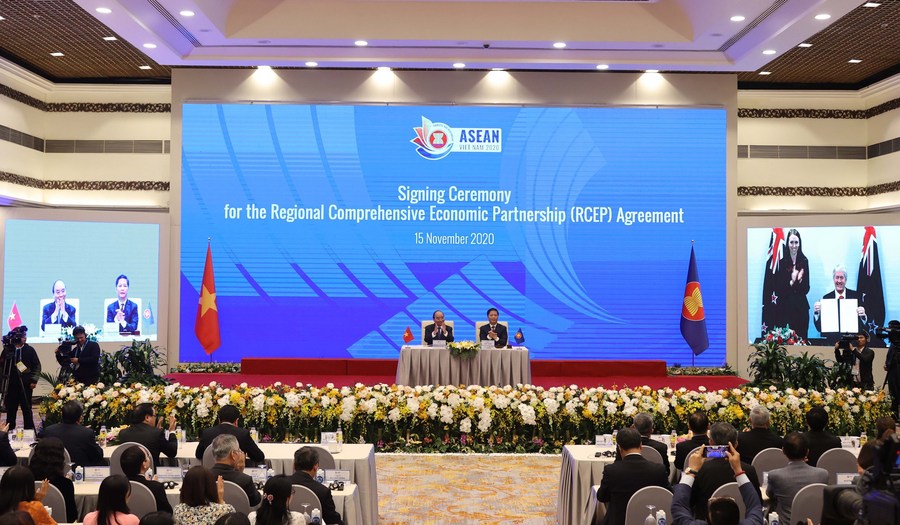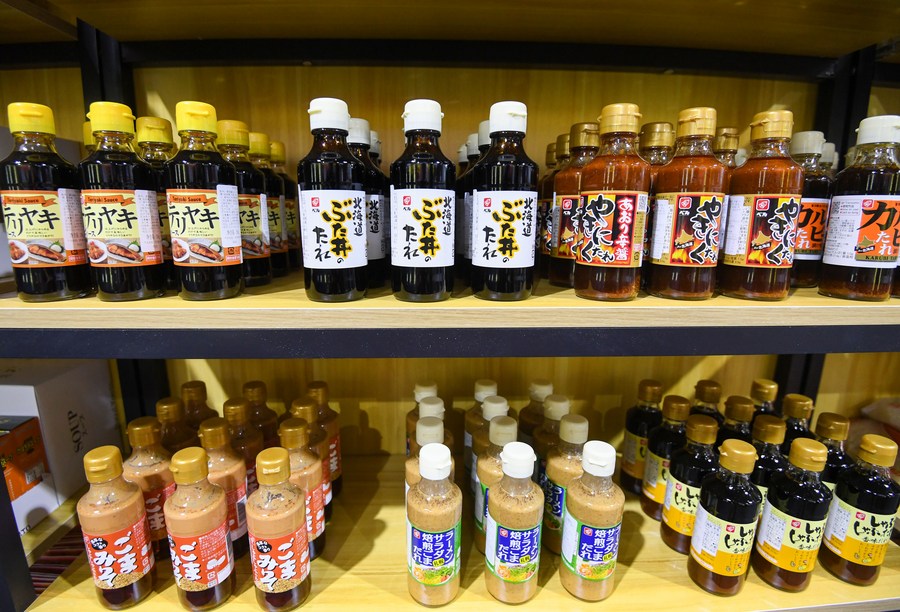Japan ratifies RCEP, world's largest trade deal including China, ASEAN

Chinese Premier Li Keqiang and leaders of other countries attend the signing ceremony of the Regional Comprehensive Economic Partnership (RCEP) agreement after the fourth RCEP Summit, which is held via video link, Nov. 15, 2020. (Xinhua/Zhang Ling)
The Japanese government has said that the RCEP accord will boost the country's GDP by 2.7 percent. For Japan, it will be the first trade deal that comprises both China, its largest trading partner and South Korea, its third largest trading partner.
TOKYO, April 28 (Xinhua) -- Japan's upper house of parliament on Wednesday approved the world's largest free trade deal, which comprises 15 Asia-Pacific countries and the 10-member Association of Southeast Asian Nations (ASEAN).
The House of Representatives, the lower house of the parliament, gave its approval earlier this month.
The Regional Comprehensive Economic Partnership (RCEP) will create a massive free trade zone which will cover roughly 30 percent of the world's gross domestic product, trade and population.

Plum wine from Japan is seen at the Food and Agricultural Products exhibition area during the third China International Import Expo (CIIE) in Shanghai, east China, Nov. 7, 2020. (Xinhua/Zhao Dingzhe)
For Japan, it will be the first trade deal that comprises both China, its largest trading partner and South Korea, its third largest trading partner.
The deal was signed by China, Japan, South Korea, Australia, New Zealand and the 10 members of ASEAN in November 2020.
The pact will enter into force 60 days after it is ratified by six of the ASEAN members and three non-ASEAN countries.
China, Singapore and Thailand have completed procedures for ratification as of Wednesday.

The signing ceremony of the Regional Comprehensive Economic Partnership (RCEP) agreement is held via video conference in Hanoi, capital of Vietnam, Nov. 15, 2020. (VNA via Xinhua)
China, the world's second-largest economy, completed the procedures for ratification on April 15 this year, and approved the ratification of the RCEP agreement on March 22, according to the ministry of commerce.
Singapore, for its part, ratified the RCEP agreement on April 9, 2021, while the parliament of Thailand approved the RCEP agreement on Feb. 11, 2021.
China's commerce ministry, in addition, has said that all RCEP signatories have expressed their intentions and will strive to complete the ratification process within the year so as to see its enactment by Jan. 1, 2022.

Photo taken on Nov. 3, 2020 shows seasonings from Japan's Hokkaido at the Food and Agricultural Products exhibition area of the 3rd China International Import Expo (CIIE) in Shanghai, east China. (Xinhua/Chen Yehua)
Once in effect, the deal will eliminate tariffs on as much as 90 percent of goods traded between its signatories over the next 20 years.
The deal will also standardize rules on investment and intellectual property to promote free trade among its signatories.
As for Japan, the government said on March 19 that the RCEP accord will boost the country's GDP by 2.7 percent.
In the country's first publicized estimate on the impact of the trade deal, the government also expected some 570,000 jobs to be created.
RCEP groups together the 10 ASEAN members -- Brunei, Cambodia, Indonesia, Laos, Malaysia, Myanmar, the Philippines, Singapore, Thailand and Vietnam -- plus Japan, China, South Korea, Australia and New Zealand.
Photos
Related Stories
- Iconic Japanese artwork turns into satirical symbol over Japan's nuclear wastewater dumping
- China rebukes Japan over diplomatic blue book
- TCS holds forum on cooperation among China, S. Korea, Japan
- Japan's decision to discharge nuclear wastewater into sea "unacceptable": Expert
- Interview: Expert warns of health risks by nuclear-contaminated water if dumped into ocean
Copyright © 2021 People's Daily Online. All Rights Reserved.










